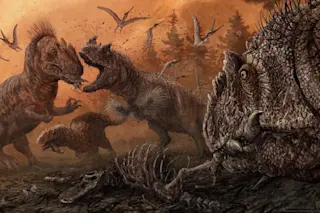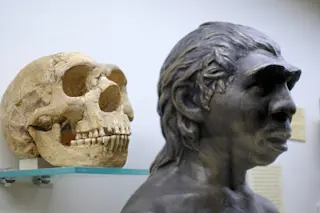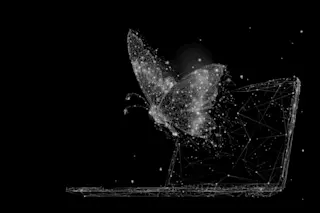A weeks ago Robert Wright had a post up, Creationists vs. Evolutionists: An American Story. Here's the crux:
A few decades ago, Darwinians and creationists had a de facto nonaggression pact: Creationists would let Darwinians reign in biology class, and otherwise Darwinians would leave creationists alone. The deal worked. I went to a public high school in a pretty religious part of the country--south-central Texas--and I don't remember anyone complaining about sophomores being taught natural selection. It just wasn't an issue. A few years ago, such biologists as Richard Dawkins and PZ Myers started violating the nonaggression pact. [Which isn't to say the violation was wholly unprovoked; see my update below.] I don't just mean they professed atheism--many Darwinians had long done that; I mean they started proselytizing, ridiculing the faithful, and talking as if religion was an inherently pernicious thing. They not only highlighted the previously subdued tension between Darwinism and creationism but depicted Darwinism as the enemy of religion more broadly. If the only thing this Darwinian assault did was amp up resistance to teaching evolution in public schools, the damage, though regrettable, would be limited. My fear is that the damage is broader--that fundamentalist Christians, upon being maligned by know-it-all Darwinians, are starting to see secular scientists more broadly as the enemy; Darwinians, climate scientists, and stem cell researchers start to seem like a single, menacing blur.
To be generous to Wright this is a hypothesis. I think that it's probably a wrong hypothesis on the face of it. Anyone who has a passing familiarity with the Creationist scene knows that its roots and origins are deep in the anti-modernist Protestant movements of the turn of the 20th century, though the modern derivations come in different garb (e.g., the Flood Geology of the mid-20th century which was originally promulgated by Seventh Day Adventists, or the Intelligent Design of the 1990s which was designed as a response to unfavorable court rulings). Rather, I think that the "New Atheism" had a brought cultural effect not on the mainstream society, but on the irreligious minority. In many ways I think that the New Atheism is a muscular secularism which is a reaction to the post-modernist relativist ennui which many non-believers in the United States in particular suffered from through the 1990s. P. Z. Myers naturally pointed out that we have a long record of polling on Creationism, and it's a rather stable trend line. I assume that short-term large fluctuations are spurious until we see more data points to shift our confidence in our prior expectations. But there's another way we can explore this question. The "New Atheism" came to the fore in the mid-2000s. The most influential of these books, The God Delusion, came out in 2006. Luckily for us the General Social Survey has a question, TRUSTSCI, which was asked in 1998 and 2008. We can then directly ask explore whether trust in science vs. religion was impacted by the broadsides against religion by Richard Dawkins et al. The question is: "We trust too much in science and not enough in religious faith." The responses are: - Strongly agree - Agree - Not agree or disagree - Disagree - Strongly disagree (note that in the GSS the responses are also coded 1 to 5 in the order above)
Your mileage may vary, but I don't see much difference. What's the moral here? Before you make a conjecture why not check the relevant social science? Unfortunately, this is not a normal reflex. I recall in the early 2000s having to deal with the media and people talk about the "great American religious awakening" as if our nation was going through a particular time of religious fervor. I was skeptical, because the first results were already coming back from the Religious Identification Surveys. Rather than a religious awakening, the USA was seeing a secular surge which had no parallel after the 1960s. The moral of the story? Vague impressions can mislead.
Trust in science by demographic, 1998 vs. 2008
DemographicStrong AgreeAgreeNeitherDisagreeStrong Disagree
1998922282912
2008725253112
1998 – Protestant122727268
1998 – Catholic421303510
1998 – None25293033
2008 – Protestant103225266
2008 – Catholic324283411
2008 – None29184328
1998 – Bible is Word of God183525184
1998 – Bible is Inspired Word of God522313310
1998 – Bible is Book of Fables43213834
2008 – Bible is Word of God154423152
2008 – Bible is Inspired Word of God319293810
2008 – Bible is Book of Fables29173933
1998 – Liberal516253321
1998 – Moderate920322711
1998 – Conservative112824299
2008 – Liberal416194120
2008 – Moderate726282912
2008 – Conservative92925298
1998 – Democrat720293013
1998 – Independent142234228
1998 – Republican824263112
2008 – Democrat624253014
2008 – Independent521283611
2008 – Republican82925298
1998 – No College102529289
1998 – College415253324
2008 – No College82826308
2008 – College317223424













